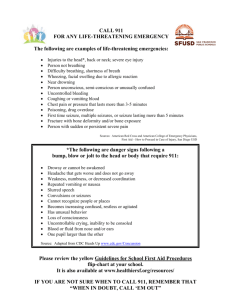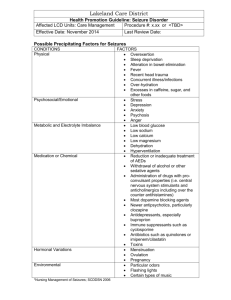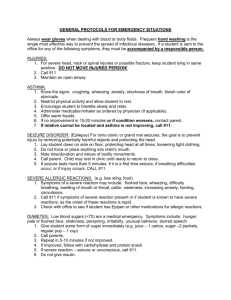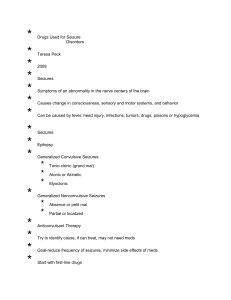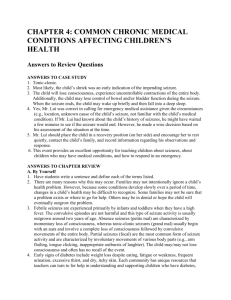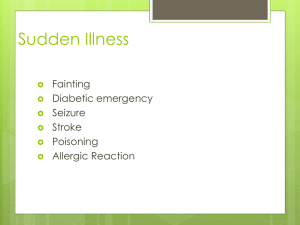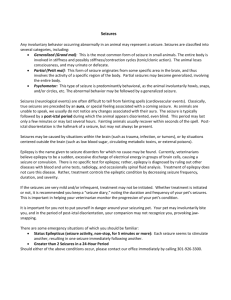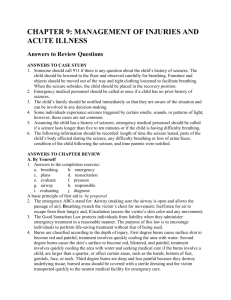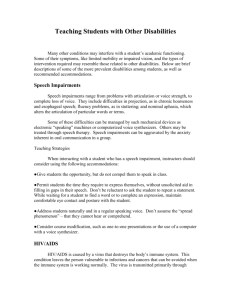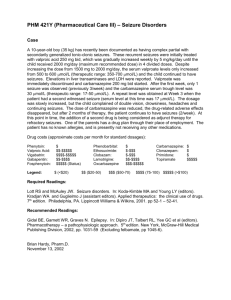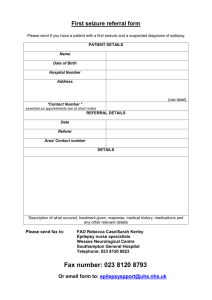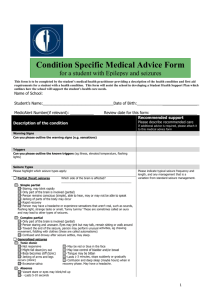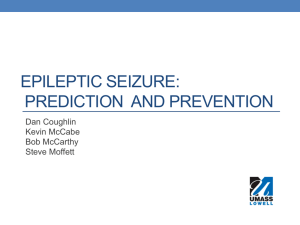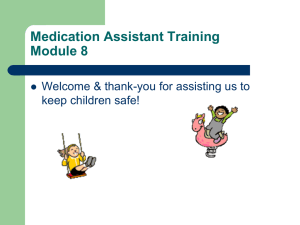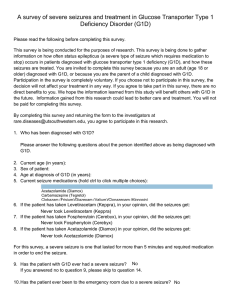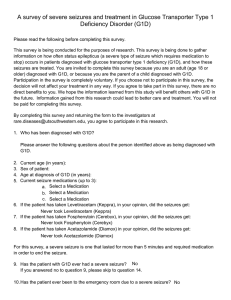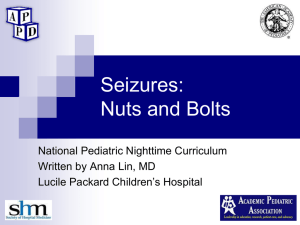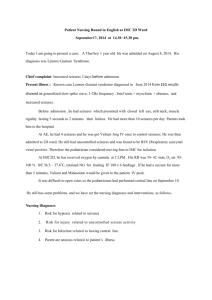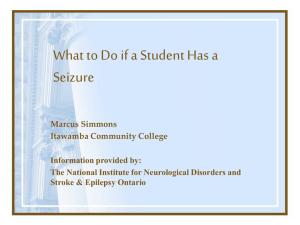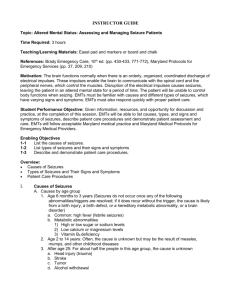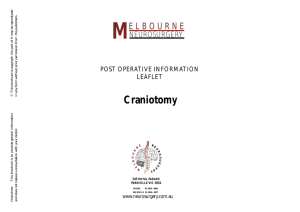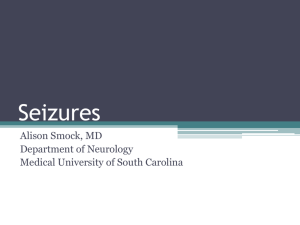Clinic-Letterhead
advertisement
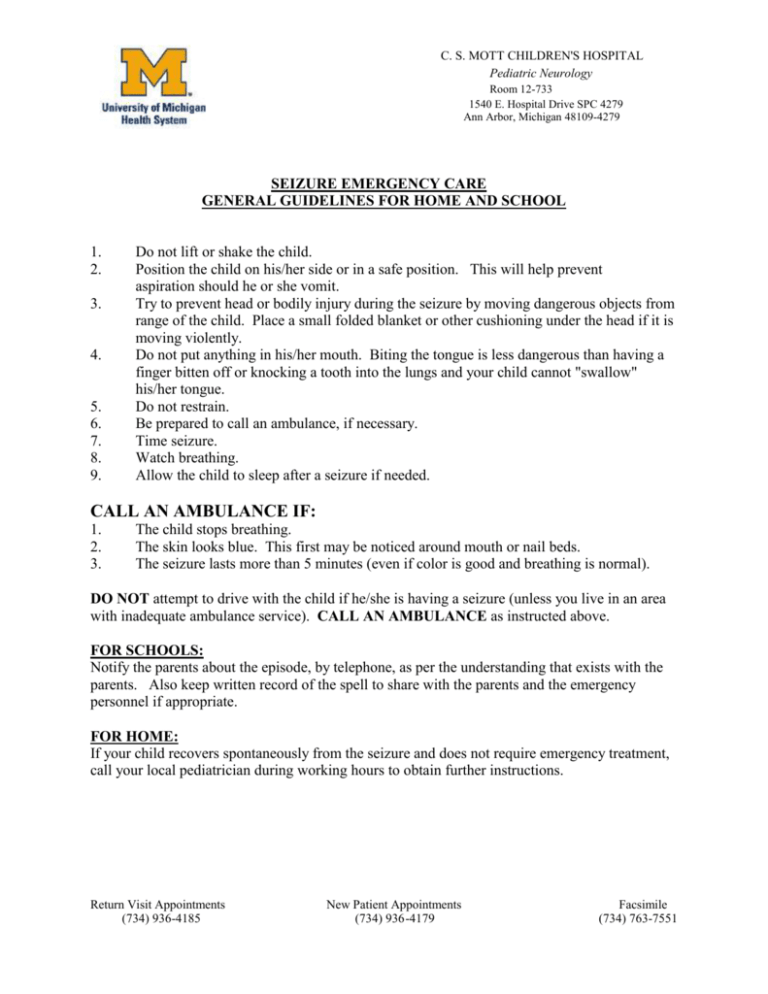
C. S. MOTT CHILDREN'S HOSPITAL Pediatric Neurology Room 12-733 1540 E. Hospital Drive SPC 4279 Ann Arbor, Michigan 48109-4279 SEIZURE EMERGENCY CARE GENERAL GUIDELINES FOR HOME AND SCHOOL 1. 2. 3. 4. 5. 6. 7. 8. 9. Do not lift or shake the child. Position the child on his/her side or in a safe position. This will help prevent aspiration should he or she vomit. Try to prevent head or bodily injury during the seizure by moving dangerous objects from range of the child. Place a small folded blanket or other cushioning under the head if it is moving violently. Do not put anything in his/her mouth. Biting the tongue is less dangerous than having a finger bitten off or knocking a tooth into the lungs and your child cannot "swallow" his/her tongue. Do not restrain. Be prepared to call an ambulance, if necessary. Time seizure. Watch breathing. Allow the child to sleep after a seizure if needed. CALL AN AMBULANCE IF: 1. 2. 3. The child stops breathing. The skin looks blue. This first may be noticed around mouth or nail beds. The seizure lasts more than 5 minutes (even if color is good and breathing is normal). DO NOT attempt to drive with the child if he/she is having a seizure (unless you live in an area with inadequate ambulance service). CALL AN AMBULANCE as instructed above. FOR SCHOOLS: Notify the parents about the episode, by telephone, as per the understanding that exists with the parents. Also keep written record of the spell to share with the parents and the emergency personnel if appropriate. FOR HOME: If your child recovers spontaneously from the seizure and does not require emergency treatment, call your local pediatrician during working hours to obtain further instructions. Return Visit Appointments (734) 936-4185 New Patient Appointments (734) 936-4179 Facsimile (734) 763-7551 C. S. MOTT CHILDREN'S HOSPITAL Pediatric Neurology Room 12-733 1540 E. Hospital Drive SPC 4279 Ann Arbor, Michigan 48109-4279 SAFETY INFORMATION FOR CHILDREN WITH SEIZURES Every child with a seizure disorder is different. Each child must be looked at individually in regard to his or her frequency of seizures, type of seizure, age, and importance of the activity. Please discuss these issues and activities with your child's physician. BIKING/ ROLLER BLADING: The child must wear a bike helmet at all times while riding a bike or roller blading. He/she should ride on the sidewalk and away from traffic. Please review with your health care provider the risks involved for your child. Certainly a child with daily seizures should not ride his/her bike until better seizure control is obtained. SWIMMING: The child should never swim alone. The child must be well supervised by someone who can save him or her and is trained in CPR. BATHING: Never leave the child alone in the bath. For older children and teens, showers are preferable to baths. Bathroom doors should be unlocked. A seizure in the bathroom is risky due to the hard surfaces. BEDROOM: Your child should not be sleeping in the top bunk of a bunk bed. If your child has night time seizures, consider placing a monitor in the room, which may alert you to the sound of a seizure CLIMBING: It is recommended that your child avoid heights. It is not recommended for the child to climb in trees or on high playground equipment. SPORTS: Each sport must be evaluated individually. Football is not advised due to the increased risk of head injury. Most sports are fine if the child's seizures are reasonably controlled and adequate supervision is available. DRIVING: The teen must be seizure-free for six months before he/she can drive. Driver's training usually can be taken if seizures are controlled. SCHOOL/CAMP: Discuss your child's seizure type, any restrictions in activities and what to do if he or she has a seizure, with appropriate personnel. BABYSITTING: 1.) When you hire a baby sitter for your child, the history and management of seizures should be discussed. 2.) If your child is a teenager, his or her ability to baby sit will depend on the nature of the seizures. Please discuss this with your doctor. You should also inform the parents hiring your child about the history of seizures. SKIING: Whether your child may ski will of course depend on the type and severity of your child’s seizures. In any case, a child with a history of seizures should not go on a chair lift alone or without someone who could restrain and protect him or her should a seizure occur. Please discuss this with your child’s neurologist. Remember that common sense plus careful evaluation of the risks of injury will help your child to be as active and involved in everyday activities as possible. Return Visit Appointments (734) 936-4185 New Patient Appointments (734) 936-4179 Facsimile (734) 763-7551
